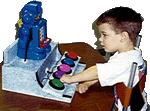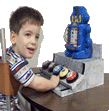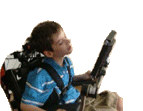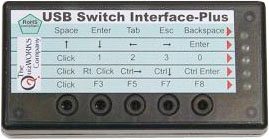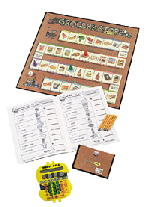|
Grocery Store Game
The engaging game was developed by PCI's Janie Haugen-McLane to
give students 'hands-on' experience in using shopping lists and
getting the "best buy" on various food items. Realistic food
illustrations on both the game board and shopping lists make the
program easy for individuals with limited or no reading skills.
Game Play
To play the game, each participant is given a shopping list of eight
food items that must be 'gathered.' The lists have illustrations of
the items for students with limited or no reading skills. All
participants can use the same lists, or they can each be given
different ones. A sample shopping list might include carrots,
chicken, angel food cake, asparagus, biscuits, mayonnaise, soft
drinks, and orange juice.
Players roll the die to move their playing pieces in either
direction on the game board. This simulates walking up and down
grocery store aisles and teaches them to locate all of the food
items on an aisle before moving on.
When a food on their shopping list is landed on, players roll the
die again to determine the price. If a 1 is rolled, they get the
Everyday Low Price. If a 2 is rolled, they get the Sale Price. If a
3 is rolled, they get the Coupon Price. Players then write the
appropriate price on their shopping list. The "Move to Any Square"
space, gives players a chance to return to a previous aisle for a
missed item or move ahead. When players land on a food that is not
on their list, play passes to the next player.
Once all items are collected, players go to the checkout counter,
total their shopping lists, and write a personal check to pay for
the groceries. Using PCI's Money Calc (available separately) at the
checkout enhances the playing experience.
Teacher's Guide
The 24-page Teacher's Guide contains detailed instructions for game
setup and play. It also features 16 different shopping list
blackline masters and a personal check blackline master. Suggestions
are given for enhanced play and numerous teaching tips are offered.
Special Features
Since players can use any of the 16 shopping lists and there are
three price possibilities for every item, participants enjoy a
different game experience every time they play. This corresponds
with the "real-life" situation where people spend varying amounts of
money every time they grocery shop.
| Game Board Sections (same as a real grocery store): |
|
• Produce
• Meat
• Grain
• Baked Goods
• Canned Foods
|
• Dairy
• Condiments
• Snacks
• Drinks
• Frozen Foods
|
Components
• Game board with 36 full-color illustrations
• Price stand
• 16 shopping lists
• 6 playing pieces
• 6 game pencils
• 1 Die (with numbers 1, 2, and 3 repeated twice)
Reading Level: Nonreaders +
Interest Level: 3 - 12
|

